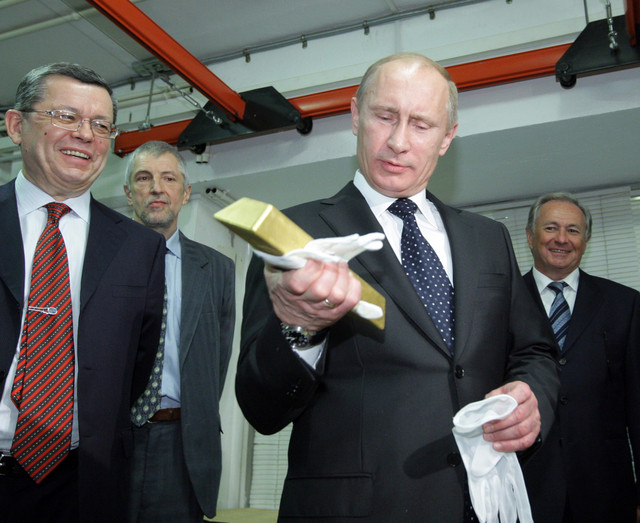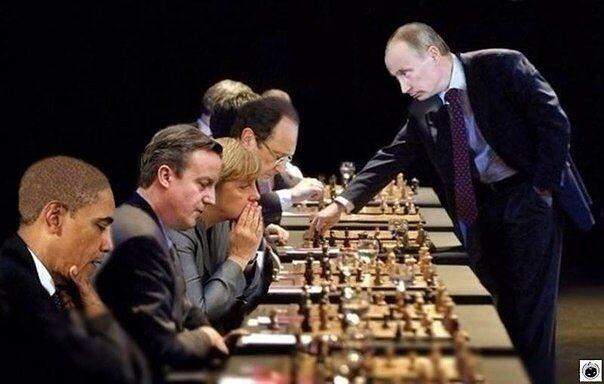– German Industry Goes To See Uncle Putin (Testosterone Pit, March 27, 2014):
President Barak Obama went to Belgium – a trip planned long ago but repurposed since the Crimean debacle – to meet with European leaders, commemorate the 100th anniversary of World War I, draw iffy parallels between then and now, and announce that more sanctions against Russia were being concocted and would soon be forthcoming, even if Russia made no additional moves on the Ukraine. The EU and the US must not sit on their hands as Russia pursues “the old way of doing things,” he said. “That message would be heard not just in Europe but in Asia and the Americas, in Africa and the Middle East.”
Russian President Vladimir Putin might have had a field day listening to the speech. But he was busy. He was at his official residence in Novo-Ogaryovo near Moscow, meeting with German industry tycoons, including Joe Kaeser, CEO of multinational engineering conglomerate Siemens. It wasn’t an emergency response to the current sanctions spiral but had been planned during their last meeting in October.
That meeting in October must have been Kaeser’s first meeting as CEO with Putin. Saturday night, July 27, 2013, Kaeser’s predecessor had been unceremoniously sacked. There was no immediate successor. Eventually, the board settled on Kaeser who was CFO at the time and has been with Siemens his entire working life. And he didn’t wait long to go see Uncle Putin.
Which shows how connected German industry and Putin are. Regular powwows are de rigueur.
So this time, Kaeser explained to Putin that Siemens, which had already invested €800 million in Russia, wanted to continue its “long-term involvement and localization strategy,” a Siemens spokesman said. The company is of the opinion “that we should not let the conversation break off even if it is perhaps difficult politically at the moment.” So it would continue to produce in Russia and help industrialize the country.
“We have built relations with Russia on the basis of long-term prospects and trust,” Kaeser said, according to Russian news agency, Itar-Tass. When questioned about the possible consequences for Siemens due to its cooperation with Russia, given the sanctions, he said, “Siemens and I personally do not feel any pressure from the federal authorities,” which had known about the visit. “And certainly there has been no pressure when the chief executive of Germany’s leading company, cooperating with Russia for 160 years, comes to meet the Russian president.”
Kaeser also met with Gazprom CEO Alexei Miller, the Siemens spokesman confirmed. Despite any sanctions, both sides favored continuing with the strategic partnership agreement they’d inked in 2011. Gazprom is currently threatening to turn off the natural gas tap for the Ukraine. Unless the Ukraine pays up, it could run out of gas in two or three months.
Siemens, which employs more than 3,500 people in Russia, partners with state-owned Russian Railways – whose president Vladimir Yakunin is on the US sanctions blacklist – to provide high-speed trains. It’s involved in energy projects and numerous other activities in Russia. Siemens isn’t alone. About 6,200 German companies were trading with Russia. The bilateral trade volume was over €76 billion in 2013. German companies have invested €20 billion in Russia, and about 300,000 jobs in Germany depend on this economic relationship. A sanctions-spiral could have “unforeseen consequences,” said the president of the German Association of Exporters, Anton Börner. It would be tough for Germany but “life threatening” for Russia. And there’d be a political price to pay as well, he warned [read…. German Exporters Fire Warning Shot About Russia “Sanction-Spiral,” Banks At Risk].
The intricate and convoluted connections between Germany and Russia can exude a peculiar aroma. Gerhard Schröder, Chancellor from 1998 to 2005, had moved heaven and earth to push Germany into a deal on the Nord Stream sub-sea gas pipeline from Russia to Germany via the Baltic Sea. It was signed in October 2005, shortly before Angela Merkel kicked him out of office. Without waiting to take a breath, he joined Nord Stream AG as Chairman of the Board of Directors.
Gazprom owns a controlling 51% of Nord Stream. The remaining 49% are owned by German mega-utility E.on, German chemical company BASF, and Gasunie, a Dutch natural gas infrastructure company. With Schröder’s infinite foresight, the Nord Stream system vastly increased Germany’s dependence on Russian natural gas.
Gazprom Chairman Alexei Miller, whom our Siemens hero Kaeser also met while in Moscow, is Deputy Chairman of the Board of Nord Stream, right next to Putin’s buddy Schröder. It’s good to have Schröder on board to bring all these people together.
Chancellor Merkel is getting the message, apparently. She has been forceful and very vocal in condemning Putin’s actions, but on Wednesday, she commented in Berlin that the West “has not reached a stage that implies the imposition of economic sanctions” on Russia. “And I hope we will be able to avoid it,” she said. “I am not interested in escalation. On the contrary, I am working on de-escalation of the situation.” Clearly, she forgot to check with President Obama recently.
Alas, it doesn’t take long for Russian humor to tear into the pronouncements of American politicians. Read…. Putin Playing Chess (Hilarious Picture, Russian Point of View)


IG Metal is powerful, and normally co-operative.
This is potentially bad as increased costs from higher wage demands destroys competitiveness with Eastern manufacturers, and nobody seems to notice, the Chinese haven’t entered the luxury car market…..YET.
http://www.presstv.com/Detail/2018/01/09/548375/Germany-Workers-Strike-Wage